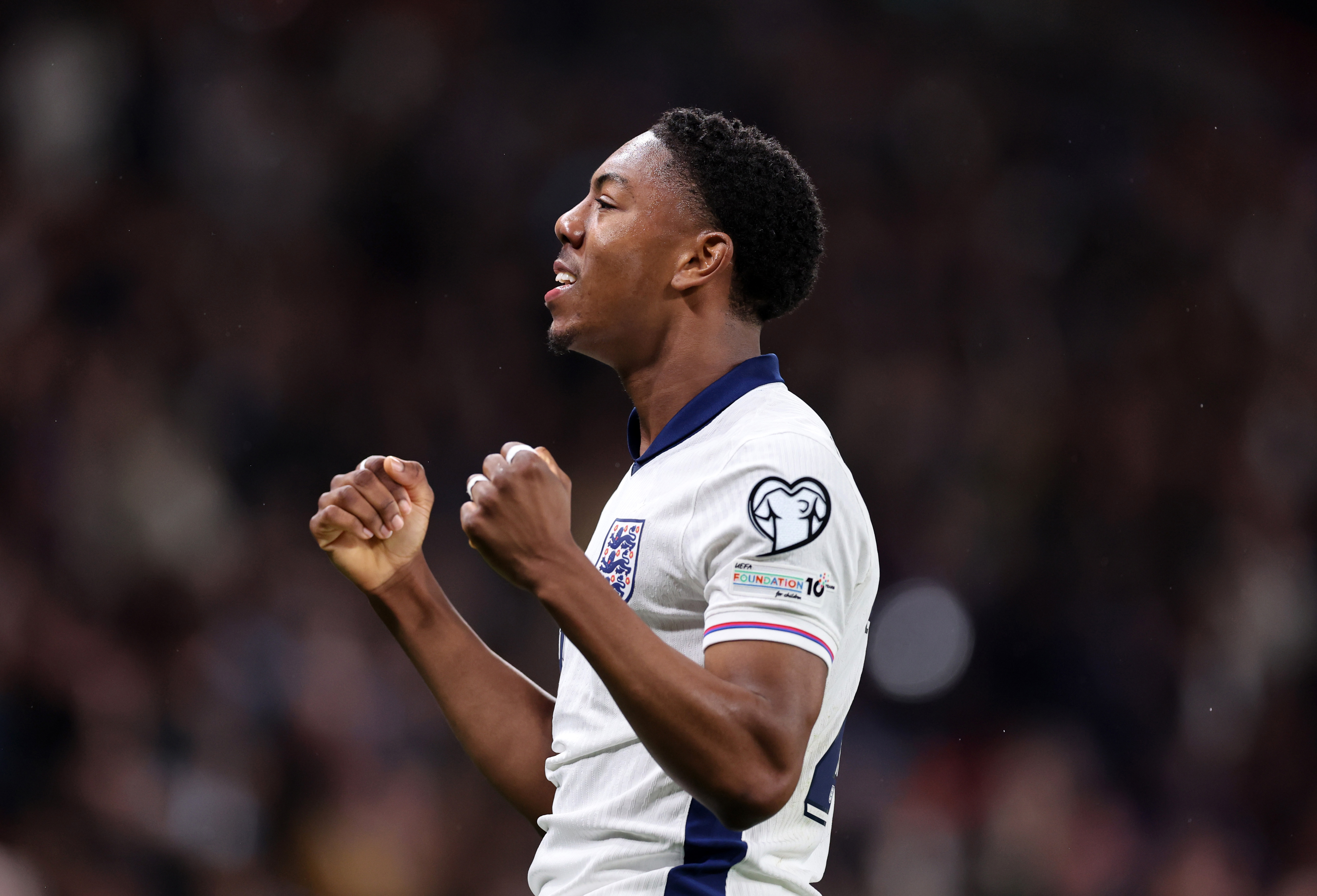Madrid is theirs? The inside story of Atletico's fight for city supremacy
FFT goes behind the scenes at Spain's newly-crowned champions...
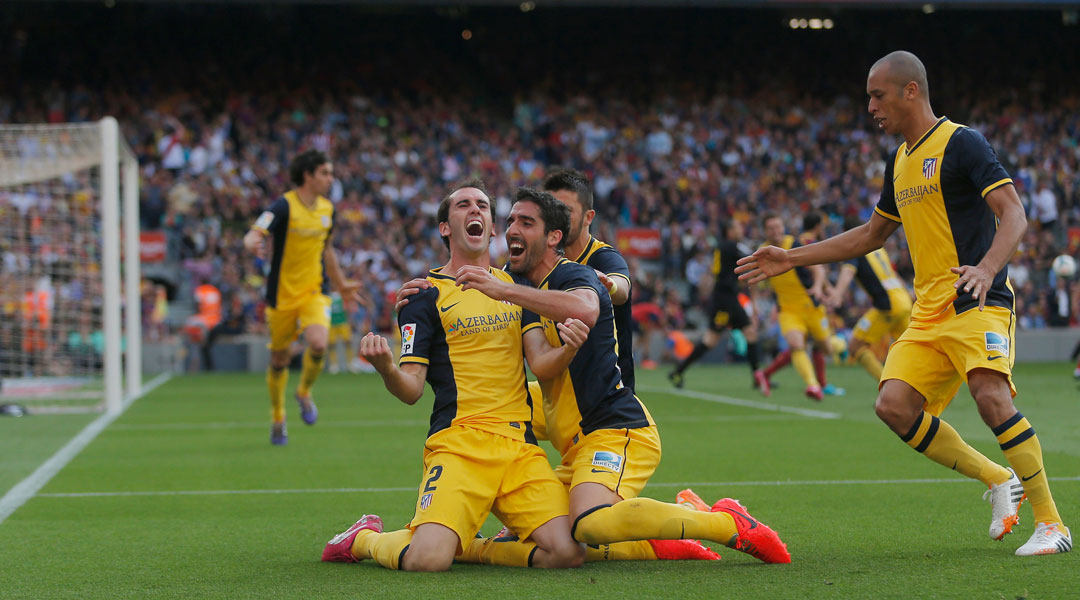
“Diego! Diego! Hey, hey, Diego!” One of Spanish football’s players of the season, Diego Costa, looks up at the gaggle of excited schoolkids calling his name – and quickly does a double-take. He’s not mistaken: they are all waving inflatable torsos at him. Koke, the young Madrileno assist king cast as the next Xavi, and his fellow local hero and Atletico Madrid’s captain, Gabi, follow suit.
It turns out that the children are there as part of an initiative with the club’s foundation, invited to Atleti’s training ground in the capital’s wealthy western satellite of Majadahonda for first aid lessons. This morning: how to resuscitate a person in a state of cardiac arrest.
Gabi and his team-mates have just finished training on the pristine, dew-soaked pitches of Spain’s third-biggest club, if judged by support and trophies, though they’re fourth in the all-time league table behind Valencia. The skipper, a lifelong Atleti supporter, probably thought he’d seen it all at the club he joined as a child, where they’ve long come to expect the unexpected. A graph of Atleti's league finishes in the last 15 years resembles a rollercoaster: small wonder at a club renowned for inconsistency through instability and infighting.
The former president once punched a rival president in a meeting while calling him “a pile of s***”. One defeat caused such outrage that players found the training ground indundated with hundreds of remonstrating fans, including a lawyer wearing a suit. And a balaclava. Atleti fans reckon they’re the most passionate in Spain and in Frente, they have one of country’s loudest and best-organised ultra groups.
This is a club that went 25 matches without beating their main cross-city rivals: Real Madrid, whose all-time leading goalscorer Raul is an Atleti fan but was released by the club he loved when president Jesus Gil disbanded the youth system to save money. It’s a club that went down to the second tier in 2000 but saw their average attendances go up to 50,000. It’s a club famed for their working-class support, yet supported by Spain’s next king.
Together, this group of footballers walking into the dressing rooms in flip-flops, past the fleet of smart but modest red Volkswagen Golf club cars that most of the first team use, have been responsible for the resuscitation of Atletico Madrid. With them is their brilliant manager, Diego Simeone, the man with 106 Argentina appearances, the most infamous of which included his theatrics in Saint-Etienne in 1998 which saw David Beckham red carded.
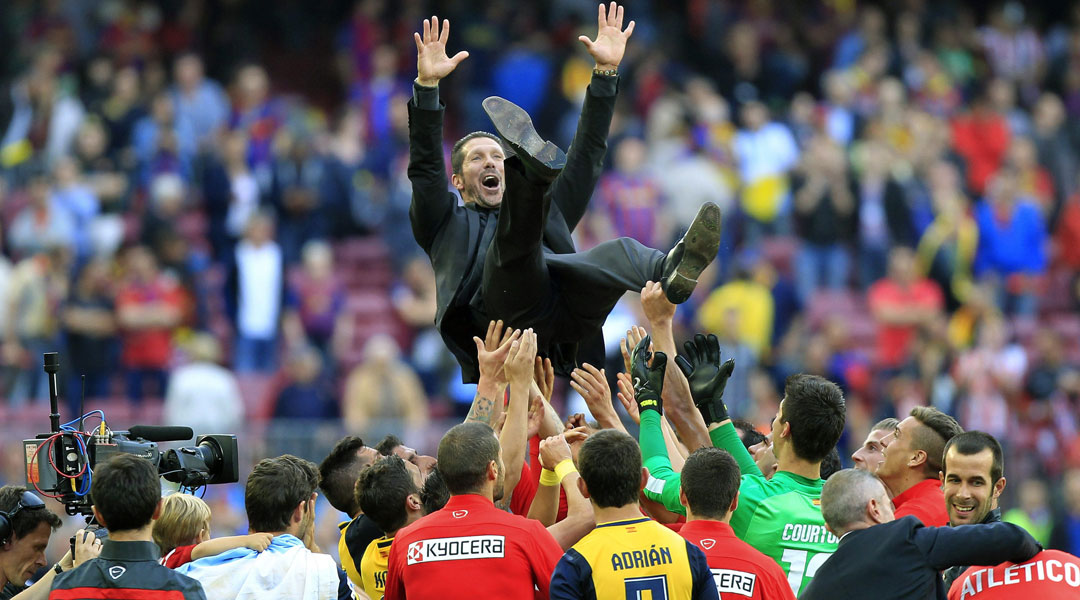
Easy does it?
Get FourFourTwo Newsletter
The best features, fun and footballing quizzes, straight to your inbox every week.
Despite saying that things “need to be taken slowly” upon his arrival in December 2011, ‘El Cholo’ – a nickname bestowed by a former youth coach who reckoned he reminded him of former Boca player Carmelo Simeone – quickly began his transformation of Atletico. Others would call it a revolution.
Simeone said he wanted to “see an aggressive, strong, combative and determined team”. His impact was immediate: six clean sheets in his first six games. They’d not managed one in the nine games before he took over. He recorded four wins on the bounce. By the end of his first season, they’d won the Europa League, beating Athletic Bilbao in Bucharest. Then they battered Chelsea 4-1 to win the European Super Cup. A historic Copa del Rey win would follow in May 2013.
As the Eurovision-winning song Euphoria, by Loreen, pumped around the bars and nightclubs of Madrid, the lyrics – “We’re going up-up-up-up” – resonated with Atleti fans and players who sang it in their many celebrations following that win. Everyone agreed: Atletico are going up and up.
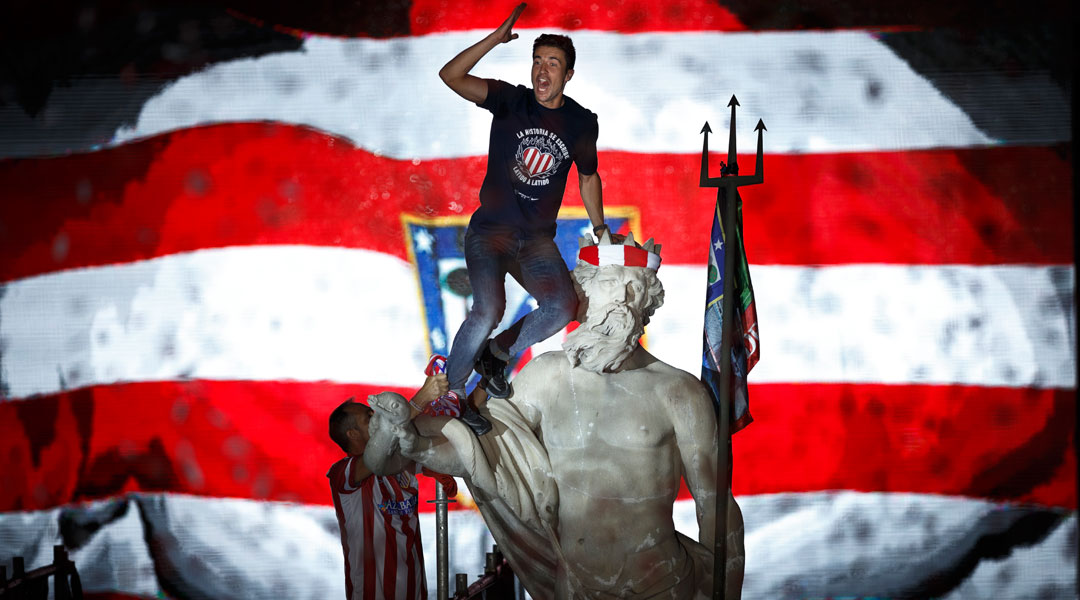
“We used to lose because the fans and players believed in fatalism – not anymore. They used to say ‘pupas’,” says Gabi, 30, when he joins FourFourTwo after training. Not anymore. Pupas means unlucky; pupas summed up Atletico, an apt adjective given all the club has gone through.
We used to lose because fans and players believed in fatalism. Not any more"
Even the son who asks his father, “Why do we support Atleti?” in a much-aired TV advert isn’t afforded an answer. Because there isn’t one. They just do. Former player Fernando Torres said fans were “a prisoner to a feeling”. “It’s a feeling, a suffering,” says Gabi. “Or it was. But we’re not suffering anymore. Because what’s happening now is incredible.”
Gabi knows the score, knows that football can be a feckless, fickle industry. He’s been bought and sold and could be excused for being cynical and talking in platitudes. But he doesn’t talk. He sings – the anthem of Atleti, belting it straight into FFT’s dictaphone so that “the British can hear our song”.
Better luck this time
There had been other periods in the past when Atletico prospered. Following the civil war, Barça and Real Madrid both struggled and Atletico won consecutive championships in 1940 and 1941. Today, Atletico’s tally of 10 league titles puts them a distant third to Real Madrid (32) and Barcelona (22). But in 1990, Barcelona had won 10 titles, Real Madrid 24.
Until this season's memorable title tilt, the gap had become a gulf, with Spanish football so skewed towards the big two that one TV executive admitted it would be “a disaster” if one of the two didn’t win the league.
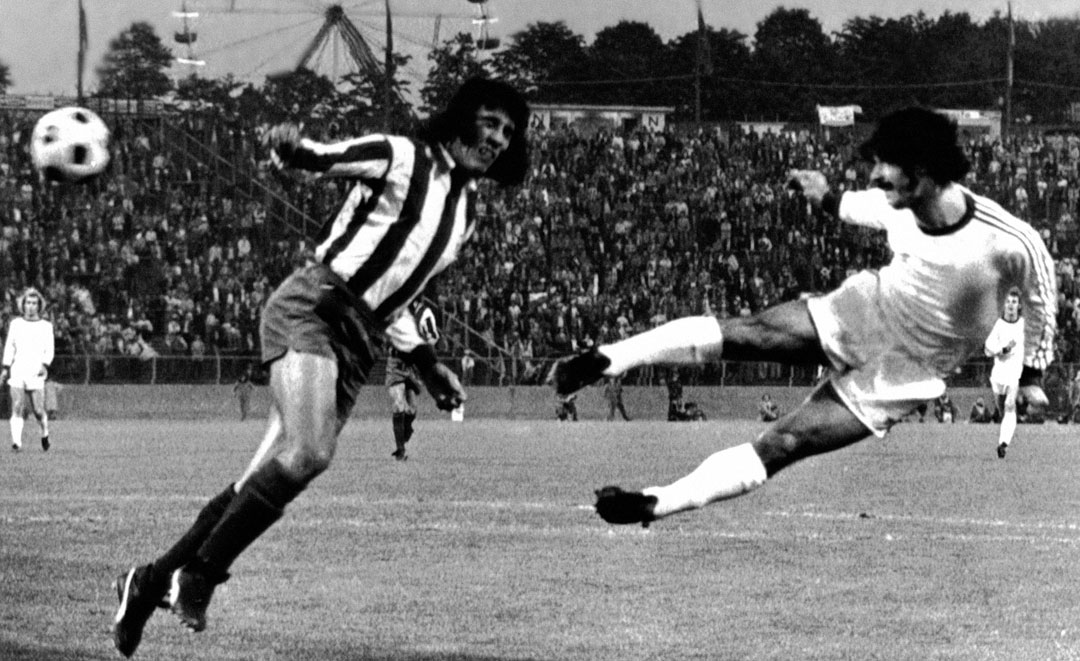
It wasn’t always so. “Barcelona mattered,” said Pirri, the Real Madrid midfielder regarded as the greatest Spanish player of the '70s, “but for us back then the bigger rivalry was with Atletico Madrid.”
Adelardo, Atletico’s club-record appearance holder with 401 league games between 1959 and 1976, agrees. “We had one of the best teams in Europe – maybe the best,” the former midfielder tells FFT. “We won the Cup Winners’ Cup in 1962.”
His side became infamous in the '70s. In the 1974 European Cup semi-final, an Atletico side with a ruthless reputation travelled to Celtic Park without six regulars. Despite being reduced to eight men, they battled to a 0-0 draw, a full-strength side winning the return leg 2-0.
“We had some very good players,” recalls Adelardo. “We played Bayern Munich in the final in Brussels. It was 0-0 after 90 minutes. Then Luis Aragones scored in extra-time. We were about to be European champions.”
But it wasn’t to be, as Bayern Munich defender Georg Schwarzenbeck hit a speculative long-range shot in the 120th minute. It went in to force a reply two days later, which Bayern won 4-0. Pupas.
Changing of the guard
On 17 May 2013, Atletico met Real Madrid in the final of the Copa del Rey. Without a national stadium, Spain switches the venue for its cup final every season. The Santiago Bernabeu was logical as it was the biggest stadium in the capital.
“It was an economic issue,” says Simeone. “The Bernabeu holds 80,000, the Calderon 53,000. What was important was that it was fair. Details mattered. Which fans were going to take which stands? Who was going to provide the ball boys and distribute the tickets? Because if it was Madrid then it would be like a home game for them. We didn’t want to be visitors, so we made sure things were done right, that half the ball boys were from us. The field needed to be neutral. We had the right to train there the day before if they did.”
The players’ behaviour is a consequence of their coach"
Logistics sorted, Simeone began his preparations. “The players’ behaviour is a consequence of their coach,” he says. “It was essential that they saw I was self-confident. I knew my team three days before the game and told them. We had personal talks and made an important video before the match. If we were scared of them then they'd kill us. We had to lose that fear.
“We showed that night that we could overcome fear. We lost to them in a league match because of fear. [Atleti’s fitness coach Oscar] Ortega said to me after the game in December [2012, which Atletico lost 2-0]: ‘I want to kill myself because we are never going to beat that team.’ I replied: ‘You are going to say that I’m crazy, but I hope we meet them in a final. Don’t ask me why.’”
How does the Champions League final sound, Diego? Come Saturday night, Simeone will know if the cojones he hailed among his side after semi-final victory over Chelsea will prove just as strong against their city rivals again in Lisbon.
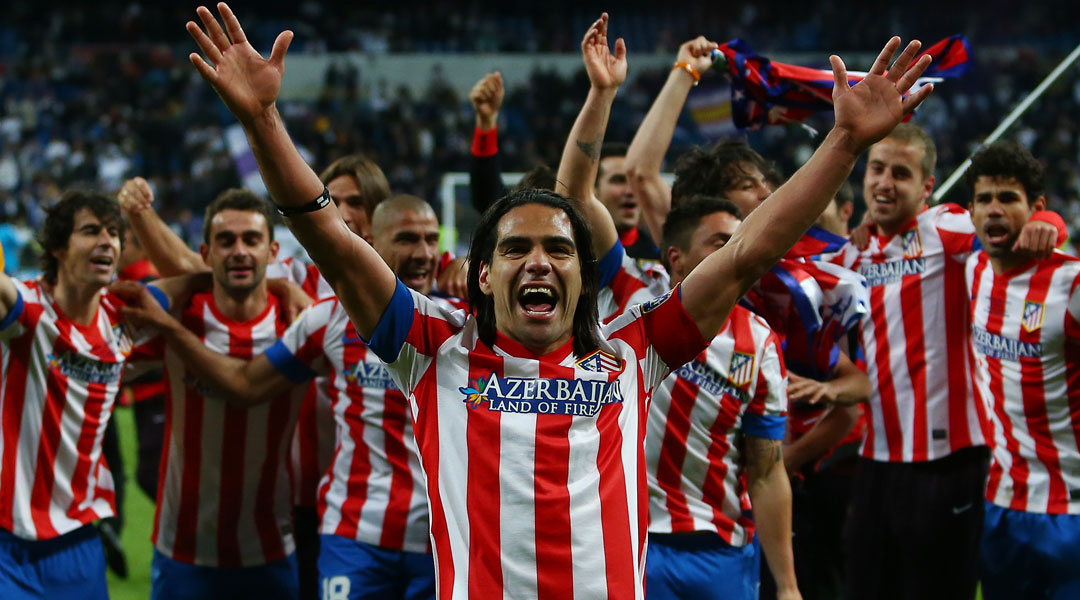
Given their dire record, Atletico weren’t expected to win that Copa del Rey showdown. “When we arrived at the Santiago Bernabeu, it was all packed with Atletico supporters,” says left-back Filipe Luis, cruelly overlooked for Brazil's World Cup squad this summer. “Real Madrid’s crowd is much more international, composed of tourists. Ours is made of passion. The moment I came onto the pitch, I noticed there were too many Atletico fans in the stadium and realised we couldn’t let them down.”
Real Madrid's crowd is made of tourists. Ours is made of passion"
Real Madrid will argue that they’ve got more type of every fan, including local ones. They averaged 65,226 at home last season in the league, Atletico 44,315. Madrid’s revenue was the only one in world sport above €500m last year. Atletico’s was €120 million.
In a topsy-turvy, ill-tempered final, Cristiano Ronaldo put Jose Mourinho's side ahead after 14 minutes, before Diego Costa equalised after 35. The game, the final one of Falcao’s two-year, 70-goal stint at the club, went to extra-time. “I told my players that in the last five minutes they’d had three corners in front of our supporters,” said Simeone. “I told them Madrid were afraid. I told them that it felt like a goal was coming. It felt that way. They had to keep pressing. I repeated to them 10 times that they were the better team. They needed to believe me and reacted in the moment that made the hair stand up on the back of my neck.”
That moment, in the 98th minute, came when Miranda scored with a header. “I can’t really explain that moment,” says the centre-back. “From that day on, the fans stop me in the streets to thank me for it. It’s crazy.”
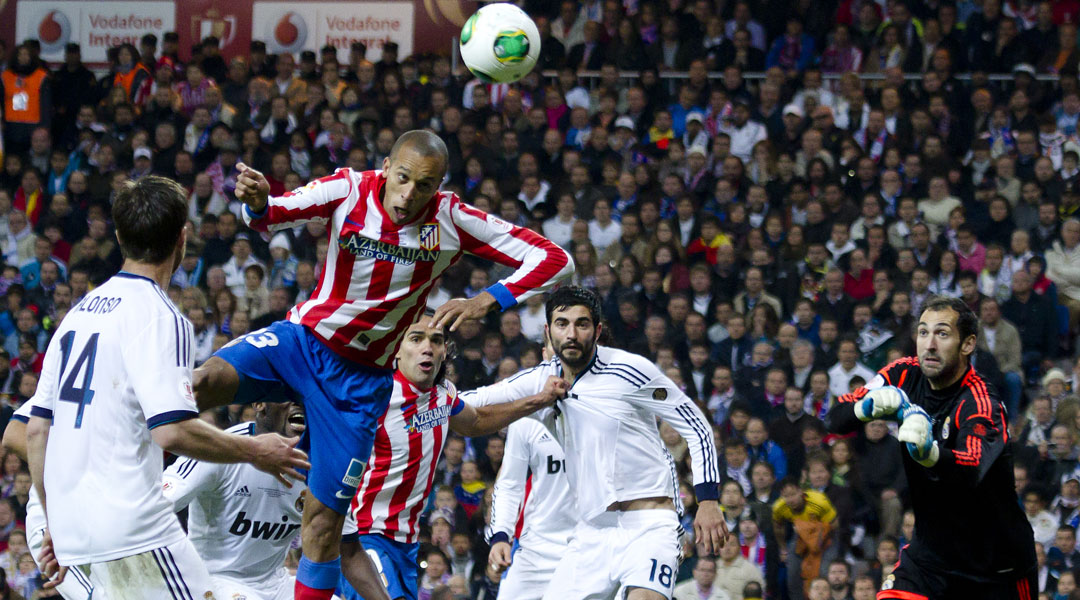
Having been sent to the stands for remonstrating with the referee, Mourinho famously refused to go and collect his loser’s medal, while the Atletico players celebrated in front of half the Bernabeu and later shaved off Arda Turan’s hair in the dressing room to honour his pre-match victory forfeit. As Koke laid an Atleti flag in the Bernabeu centre circle, Simeone reflected. “It was like a movie with the best ending. I compared it with when Estudiantes beat Boca Juniors in 2006, something they hadn’t done for 10 years. We put in an extraordinary performance.”
For the unrelenting Simeone, this wasn’t enough; he was already thinking of the future. “When the match finished, I sat there watching the celebrations. I didn’t enjoy it. Instead of celebrating success, I think about how difficult it will be to repeat the extraordinary effort.”
Crushing the odds
This season it got even better. The Rojiblancos were 66/1 to lift the title at the start; then eight straight wins in their first eight league games, including a 1-0 win at the Bernabeu – the first time they’d won two consecutive games there since 1920 and 1921 and a result which led to a ‘Millions 0 Football 1’ headline on the cover of AS – meant talk of their title credentials increased and the odds dropped to 14/1.
The end to their season didn't go without its wobbles – while Barça faltered so did they, not least with a 2-0 defeat at Levante followed by a 1-1 draw with Malaga before their final-day decider against their Catalan rivals. But in that crucial Camp Nou clash, despite losing Diego Costa and Arda Turan to injury inside 23 minutes and falling behind to Alexis Sanchez's first-half opener, Simeone's fighters got the point they needed in a 1-1 draw.
“In the decisive moments of our history, it always went against Atleti,” says Gabi, once a ball-boy at the Calderon. “But we’re not pupas any more. We’re winners.”
This feature is an extract from our December 2013 cover story, when we found out what makes Spain's new kings tick (that's official now and everything - don't say we didn't tell you so). Download the issue for iPad here.
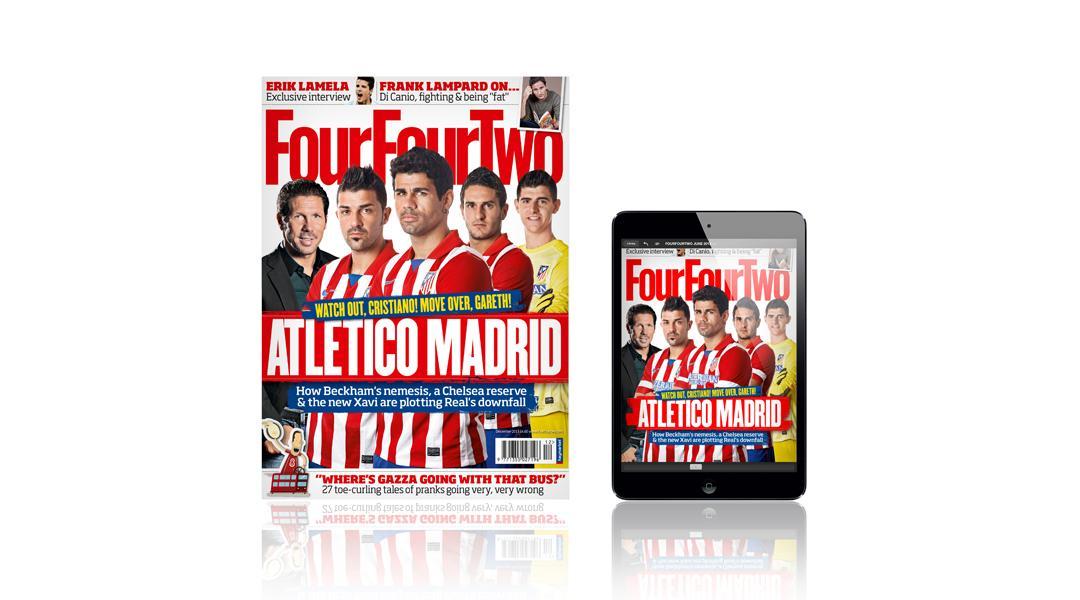

Andy Mitten is Editor at Large of FourFourTwo, interviewing the likes of Lionel Messi, Eric Cantona, Sir Alex Ferguson and Diego Maradona for the magazine. He also founded and is editor of United We Stand, the Manchester United fanzine, and contributes to a number of publications, including GQ, the BBC and The Athletic.
